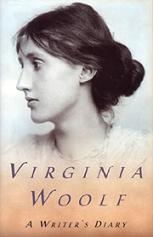
A Writer's Diary
Virginia Woolf
350 pages including index
published in 1953
A Writer's Diary is an extract of her personal diaries put together by her husband and widower Leonard Woolf a decade or so after her death. It's been edited to keep out the more personal entries as well as to slim down the original twentysix handwritten volumes to a more managable size. What remains is a volume of entries detailing Virginia Woolf's writing process, enlivened by sprinklings of literary gossip and the occasional entry talking about the general state of the world. The diary starts in 1918 and ends in march of 1941, not long before her death. Although the only other Virginia Woolf book I've read was A Room of One's Own some four years ago, this didn't really matter; you don't need to know her other work to find meaning in this, nor is it spoiled by reading about the process by which it was created first.
Virginia Woolf was not the happiest of writers. Throughout her life she suffered from nervous breakdowns, as also seen in her diary, and she ultimately ended her life by drowning herself after she felt "the madness" returning. She also suffered from extreme mood swings, which is clearly visible reading through A Writer's Diary, where one day she would write with pleasure how well the writing on a given book went, the next day despairing about the critical reception she expected for the same book. In some of the entries talking about social events you can also see that while she enjoy being social, these sort of things took a lot of energy out of her. As somebody relatively introvert myself, I can sympathise.
A Writer's Diary covers the period in which Virginia Woolf's major works were published, from her second book Night and Day, through such classics as To the Lighthouse, Orlando, The Waves and The Years, to the last book whose manuscript she finished before her death, Between the Acts. As such then it gives a good idea of how she tackled her projects, as well as the stresses they brought with them. Most of them were things to struggle with, with the struggles getting more difficult over time, as she took on more and more ambitious books. Only sometimes she managed to write a book that wasn't a struggle to be born and didn't damage her health.
In general, the descriptions which Woolf gives of how she writes her books are the most interesting parts of the diaries. Each book seems to follow a set pattern. She gets an idea while working on something else, tries to ignore it for some time while finishing the last project, then starts to work on it with lots of zeal and energy. Often she has to break of writing one or more times during that first spell of creativity, the pressure getting too much for her or for want of inspiration. She recharges her batteries by reading the Greek classics, or great Victorian novels, or by working on criticism or an article for the Times Literary Supplement. She returns with new energy, but ultimately the book turns into a slogging march, especially after the first draft is finished. She writes in longhand, then revises and types it out to sent to the publishers, after which she has to have a new round of revisions as prompted by her editor. With the later books the process gets even tougher, as she refines and revises multiple times. Because she's such a perfectionist, each succesive book takes longer to write. It's no wonder that at the end of it all she's more than a bit depressed about the reception the book will get...
What's also interesting is to get a glimpse at the literary scenes during those years. Though we divide literary history in distinct eras and groups, the reality is of course different. Woolf in her diaries doesn't just mention those we consider her contemporaries, but also survivors of Victorian times she comes across, like Thomas Hardy whom she meets at a party. You also get glimpses of the reality of the literary scene of the time, rather than the telescoped English lit view we have looking back at it.
While A Writer's Diary is a great book if you're interested in writers and writing, I have to admit it was a bit of a slog in places. The nature of a diary always means a lot of repetition and Virginia Woolf's diary is worse than others in this regard. Her repeated struggling with her various books get somewhat wearing after a while.